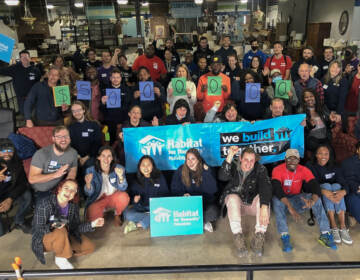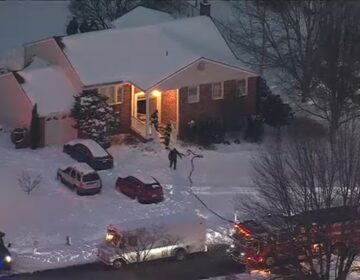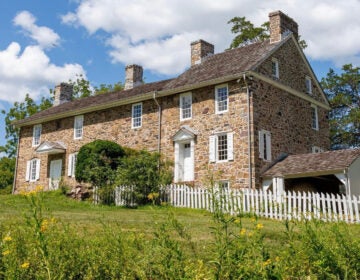‘They’re stuck, they’re scared’: For older people, Bucks County has a major affordable housing crisis
Advocates see a rise in people on the brink of displacement or already unhoused. Older adults face unique obstacles to finding new places to live.
Listen 5:37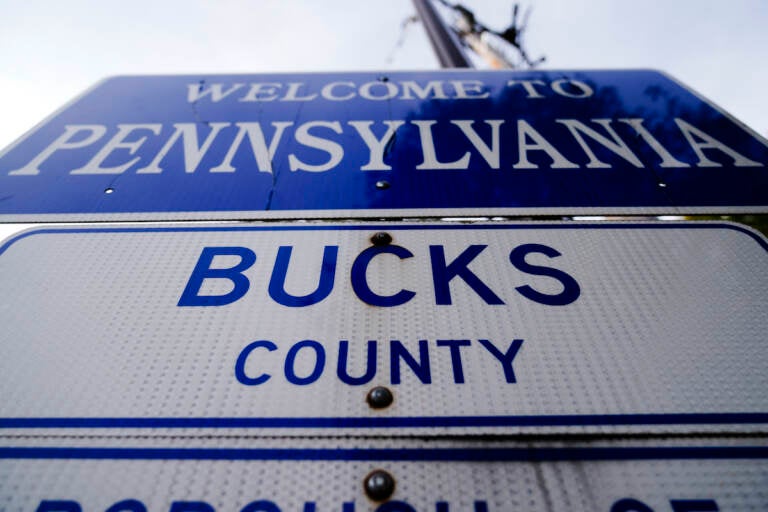
A sign is posted in New Hope, Pa., upon entering Bucks County from New Jersey, Thursday, Nov. 4, 2021. (AP Photo/Matt Rourke)
Got a question about life in Philly’s suburbs? Our suburban reporters want to hear from you! Ask us a question or send an idea for a story you think we should cover.
On a freezing evening some weeks ago, Jeffrey Weighknecht was in the Quakertown Walmart parking lot, keeping warm in his truck, waiting for the Upper Bucks Code Blue shelter to open.
He usually sits in the Quakertown Free Library until it closes at 8 p.m. If it’s below 20 degrees, he goes to the shelter at 9. Otherwise, Weighknecht sleeps in his truck, with the heat on.
“As long as I got gas,” said Weighknecht, 57, who is unemployed. He was let go from his job as a production technician for Harley-Davidson Motorcycle Co. in August. Then he had a stroke in December and permanently lost vision in his right eye.
The truck has been his only reliable place to stay.
Affordable housing was the greatest need identified in a 2021 community survey whose results were released in March by the Bucks County Opportunity Council (BCOC), the county’s leading anti-poverty agency. The third most common need identified by low-income residents: resources for older adults.
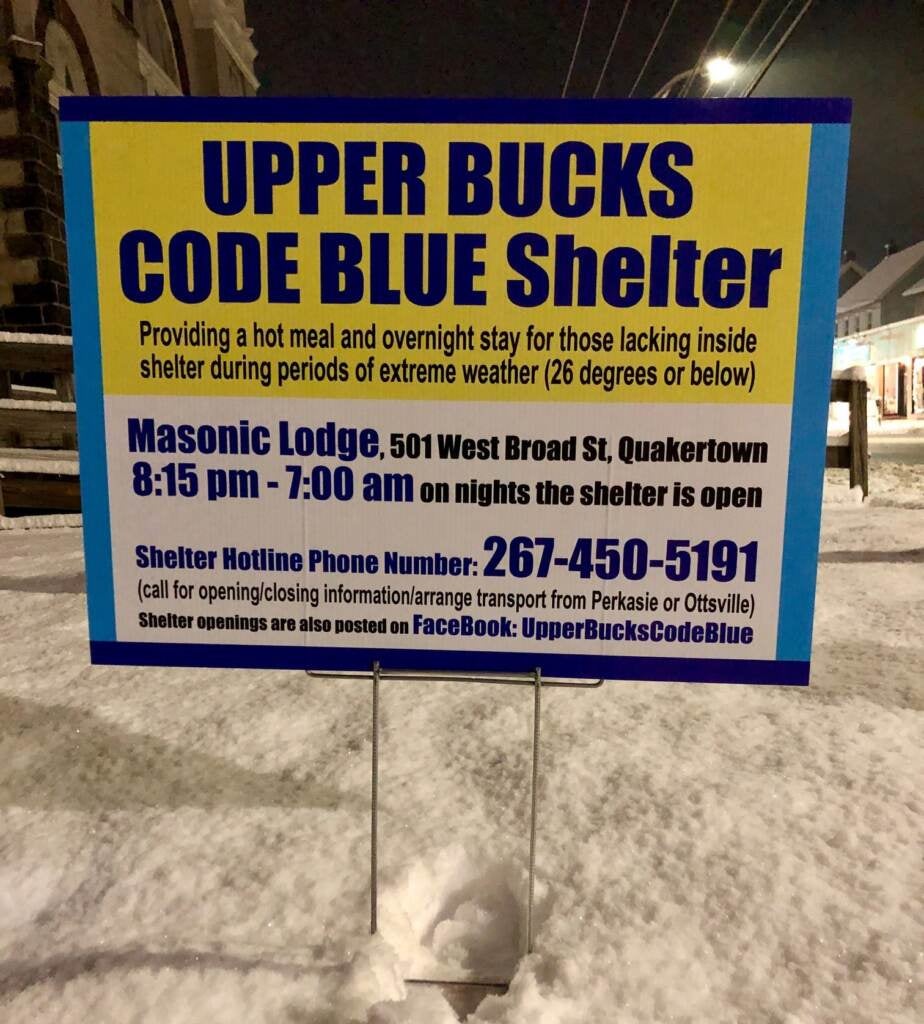
Bucks County housing agencies and advocates say they have seen a rise in community members on the brink of displacement or already unhoused. And finding affordable housing is an issue for all age groups across the county. But older adults face unique obstacles in the process.
Grundy House in Quakertown, the only affordable housing complex there for seniors or single adults with disabilities, has a waiting list of two to three years. So do all of the county’s affordable housing complexes for seniors, according to the BCOC. Nationwide, the aged homeless population is growing rapidly and will continue to grow for the next decade, according to a 2019 study by the University of Pennsylvania.
For the unhoused in Quakertown, trying to stay warm can be a juggling act. Once the Code Blue shelter closes at 7 a.m., sometimes it can be colder outside than when he entered, said Weighknecht.
“There’s no place to really get warm around here,” he said. “The library don’t open until 9 a.m., we gotta be out by 7 a.m., so you got two hours to blow off.”
When Weighknecht was in the hospital after his stroke, they gave him a list of shelters to call. But he said he was confused as to what he was supposed to do after that.
“It [was] like, ‘I don’t know what I’m looking at because I’ve never had to deal with it,’” said Weighknecht.
It was his first time experiencing homelessness. He said he wondered, “Who can I talk to about it? I figured they’d have someone to help in the hospital. They just wanted to get me out of there.”
He was told to leave after six days. He had his truck dropped off and slept there from then on.
“That’s just the way it is,” said Weighknecht, who is white. “They need the bed. It’s all about money. And I didn’t have any money.”
Resources are limited in Upper Bucks County, even compared to Lower Bucks. There are no public showers except at the Quakertown YMCA, which is not always available, while in Bristol, a group called Advocates for Homeless and Those in Need runs a weekly shower initiative.
In Quakertown, there also aren’t any public restrooms to use at night in colder weather beyond the library, which closes at 5 p.m. on Saturdays and doesn’t open on Sundays.
All together, those obstacles led Weighknecht to feel invisible.
“We’re not seen, really,” he said. “There are a lot of people that you don’t even see at the shelters ’cause they’re living in their cars and parking somewhere else and don’t know that the shelter is there.”
Dave Heckler, who runs the Code Blue shelter in Quakertown, said that though unhoused people may be less visible there, their numbers are growing, and they need more resources.
“Everybody’s stereotype of a homeless person is that they’re sitting on a steam grate on a city sidewalk in a cardboard box. And that’s not reality up here at all,” said Heckler, “And that’s not reality probably for the vast majority of homeless folks. Busting that stereotype is critical.”
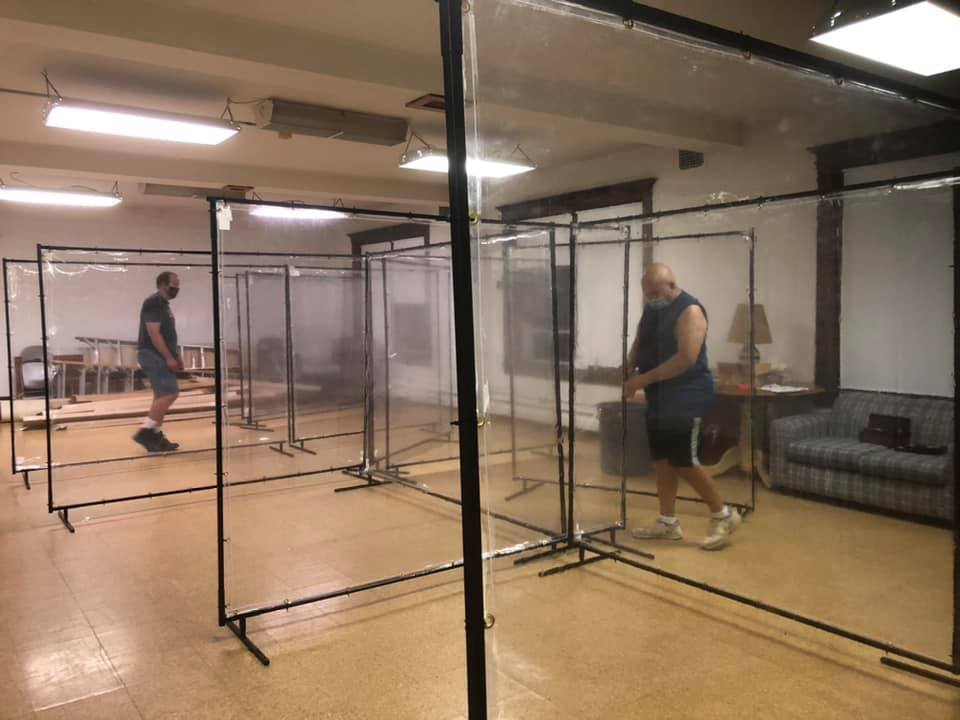
The county’s only 24/7 shelter is in Levittown, in Lower Bucks, what would be a 30-plus-mile drive for Weighknecht and far from his community resources. That shelter is at capacity, with a waiting list of 140 families.
But in Lower Bucks, too, affordable housing is scarce.
Rich, 71, has lived in a Levittown house for 13½ years. But now, he’s on the verge of being homeless as well.
Kendra Transue, BCOC’s housing location supervisor, said she’s getting more calls from seniors, like Rich, who have been in the same place for a long time and are about to be displaced. Like Rich, many of their homes are suddenly being sold or their landlords are raising the rent.
Rich, who is Black, asked that his full name not be included in this story, out of fear that a potential new landlord would see it and eliminate his application from consideration.
On a rainy afternoon last month, Rich was packing his belongings into cardboard boxes. He didn’t know what his next move was.
Leaning over a box, he listed the things he was slowly wrapping in old newspapers. “That’s my crockpot roaster thing that you can put a turkey in, my knife sharpener, my toaster, my little scale …”
He said he might just head to a cheap motel nearby until he can find an affordable place to live, which has been difficult.
Since the start of the pandemic, said Karen Hammerschmidt, executive director of Quakertown Community Outreach, her organization has generally seen more unhoused people and people in need of affordable housing, including older adults.
Heckler said the Quakertown shelter is “stretched thin.” Through the winter, it served beyond its capacity, about 19 people a night. The age of his unhoused neighbors is growing higher, he said, and access is an issue because some can’t get to the second floor without an elevator.
So if folks can’t handle stairs or they’re using a walker, “they literally can’t get into our building,” said Heckler.
Scott McElree, Quakertown’s borough manager and chief of police, said he hasn’t seen an issue with homelessness in the area, that he isn’t aware of it, and that it may be a “false narrative.”
“We need to validate it, and then we need to be part of the solution,” said McElree.
Heckler hopes to sit down and talk with Quakertown Borough officials about the growing need for resources. He’s also hopeful about a countywide task force focused on building tiny homes, like the ones proposed in Philadelphia.
“The borough is not this big, bad elitist that doesn’t want affordable housing in the borough. We’ve got plenty,” McElree said. The county has not come to the borough to inquire about another affordable housing project, he said, but if they did, he would be open to the conversation.
Jeff Fields, county director of housing and community development, said Bucks wants to build more affordable housing but is faced with obstacles including getting funding from the Pennsylvania Housing Finance Agency, municipal zoning laws, and gaining public support.
One new affordable senior housing complex is coming to Sellersville. Applications will open in April. Two projects the county submitted to the state Housing Finance Agency last year didn’t get funded, according to Fields.
Hotels are sometimes the only alternative
Often in Bucks County, people turn to rooms in budget hotels because there are no other options.
Many in Quakertown were staying in the Bush House Hotel, which was condemned in November for unsafe and unsanitary conditions.
Quakertown Community Outreach kept a chart of all the people the group was assisting in finding housing when Bush House was closed. Out of about 60 people on their list, all Quakertown residents, none found affordable, permanent housing.
The borough has just lifted the condemnation, and 40 former Bush House residents have returned, all from Quakertown, according to the Bucks County Opportunity Council.
The BCOC tries to help people find affordable housing in the private market, but, according to Transue, it’s almost impossible.
Almost half of renters in Bucks County are spending more than 30% of their income on rent. According to a U.S. Census estimate, the average rent in 2019 was $1,257 per month. Such costs have surged during the pandemic.
Many older adults are on fixed incomes through Social Security or SSI. The latter is $841 a month in Pennsylvania. SSI is meant for both rent and basic necessities, but it’s just not enough in Bucks County.
The Bucks County Housing Authority also has a rental limit for its voucher program. In Quakertown, for a studio apartment, that’s $1,068, including utilities. The limit was just raised on Jan. 1 from $990. If rent is above $1,068, the vouchers can’t be used.
Transue said finding a place for $1,068 and a landlord who will accept someone using a voucher when they are receiving maybe 30 other calls the first day a property is posted, is nearly impossible.
“In the private market, I won’t lie, the concept of affordable housing for older adults, particularly on fixed incomes, without having a massive pension or retirement and all that, is almost nonexistent,” said Transue.
It’s also difficult to find apartments that are physically accessible for seniors, on the first floor or without stairs.
Then it’s up to whoever is fastest and most tech-savvy to jump on a listing — which, Transue said, often leaves older adults behind.
They’re stuck, they’re scared, they’re confused
A lot of the older adults Transue works with never thought that — after working their entire lives — they would experience being unhoused.
“They’re stuck, they’re scared, they’re confused as to why,” said Transue. “There’s a lack of knowledge on how to navigate the system. … They don’t know what’s going to happen next. They don’t know what to do. They may not have the biggest support system left to lean on.”
Rich agreed, and said not having the same kind of social network or foundation as younger adults leaves older adults feeling stuck. He said he had one friend that he could ask to house him temporarily.
“He told me he had to think about it,” said Rich, who has cats he’s trying to find homes for, too.
Rich grew up in Levittown, and is an artist, a sculptor, and a woodworker. His current Levittown home is full of his artwork: a sculpture of a head; a pencil drawing of a young boy in a desert; his cats’ wooden home.
“I grew up in the wrong place,” said Rich. “If I was in Italy, I’d probably be chiseling a lot of marble.”
He’s worried he won’t find another place with as much space. He has a small rowhouse now, with enough room for his workshop.
His landlord hiked his rent by $300, from $900 to $1,200. Rich said was relying on a roommate for some cushion for a while. But the roommate recently moved out. Now, the new price is too much of a strain for Rich. Either way, his landlord decided to not renew his lease.
Rich said he has been taking care of the home he’s leaving. He reframed the house because it was rotting, replaced the old stove with a new one, and put in a washer and dryer. The landlord has sent someone three times to patch his roof, which continues to leak when it snows.
“If it’s not broke, they don’t care if it’s not fixed right,” said Rich.
After the rent was raised, he considered going back to work. He decided not to because of a foot injury. Anyway, he said, “I’m too old.”
In his search for a new home, he found an affordable apartment in Philadelphia but wasn’t eligible because he doesn’t have a credit score.
Rich said he has noticed many other older adults at a loss for a way forward.
“When you take a person that’s had a stable life all his life, and work, and he’s had a place to stay and then he becomes homeless, he’s not qualified to handle that type of problem,” said Rich.
“They’re in a situation that they never was prepared for. And now, they can’t find a solution because they’re not prepared to find a solution for this. And most of the time, there’s no solution.”
WHYY is your source for fact-based, in-depth journalism and information. As a nonprofit organization, we rely on financial support from readers like you. Please give today.


